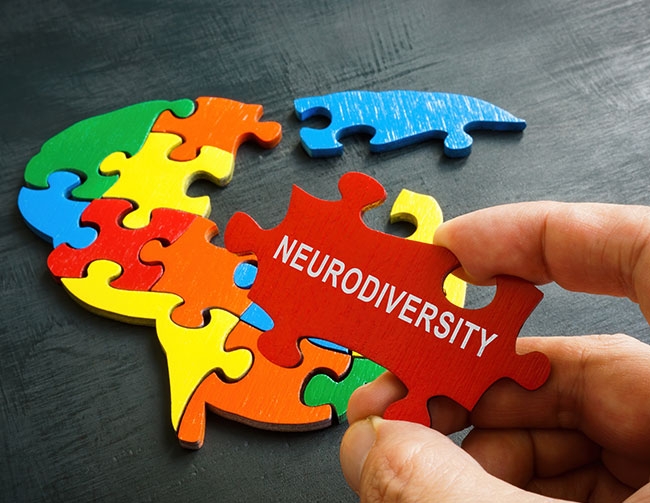The term ‘neurodiverse’ refers to individuals who display “neurologically atypical patterns of thought or behaviour” (Oxford Languages). It is usually used to describe conditions such as autism, ADHD, dyslexia, and dyspraxia.
An individual with one of these conditions might have difficulty with one of more steps of the hiring process. C.V.s and cover letters have been used for decades in job applications (see our last blog for more on this) but these are predominantly designed for neurotypical minds. A neurodiverse candidate could be the perfect person for the job but might be put off applying for a position, or even get rejected prematurely, purely because they are a square peg in a round hole within the traditional recruitment system.
Many industries across the UK are facing severe skills shortages. At the same time, it’s reported that “the unemployment rate for neurodivergent adults is three times the rate for people with a disability, and eight times the rate for people without a disability”. Furthermore, a 2017 study shows that “just 16% of autistic adults are in full-time employment in the UK, even though 77% of unemployed autistic adults want to work.”
In short, the recruitment sector needs to introduce inclusive hiring processes to attract and access this largely untapped pool of talent.
A report from Executive Grapevine reveals that 62% of HR and business industry leaders “don’t have measures in place to add neurodivergent-friendly practices in their hiring process”. And when neurodiverse adults do secure a position, many don’t feel that they are fully supported in their role, and that their employers aren’t accommodating enough.
For example, neurodiverse individuals might find a bustling office environment distracting; they may need a quiet workspace to concentrate. A flexible employer could allow neurodivergent employees the option to work from home or provide noise cancelling headphones if this isn’t an option. Many of the neurodivergent respondents that took part in the Executive Grapevine report admitted that, when they’ve broached this subject with their employer, instead of being given reassurance and support, they were met with accusations and microaggressions.
NHS waiting lists can leave neurodivergent adults without a diagnosis for years, which can make it even harder for them to approach an already unsupportive employer for more flexibility.
Many organisations might perceive neurodiverse and disabled candidates as a ‘burden’. They may not want to go to the effort of adapting their work environment to accommodate an employee if there are suitable neurotypical candidates to choose from. However, rejecting a candidate just for being neurodiverse, or refusing to accommodate their requests for reasonable adjustment, would likely be classed as discrimination in a relevant tribunal.
ACAS states, “When hiring, it’s usually against the law for an employer to discriminate against job applicants because of any of the following, known as ‘protected characteristics’: Age. Disability. Gender reassignment”.
Neurodiverse candidates are the opposite of a burden; in many cases, their atypical traits bring something different to workforces and they can often solve problems with solutions that wouldn’t occur to neurotypical minds. A 2021 report by JPMorgan Chase found that “neurodivergent employees in certain tech roles could be up to 140% more productive than neurotypical colleagues”.
As specialists in recruitment website design, we know the importance of inclusive hiring processes. To ensure that a job advert is accessible and accommodating to every candidate, recruiters should:
• Create job adverts that are clear and concise. Candidates shouldn’t have to decode an advert to find out basic information like salary and expected duties.
• Display the specific skills needed for a candidate to perform that job successfully, and avoid generic phrases like ‘excellent communicator’, ‘self-starter’, and ‘team player’, unless they are explicitly necessary for the role.
• If possible, enquire about a candidate’s portfolio or examples of their work, rather than have them try to summarise their skillset.
• Include a Diversity, Equity, and Inclusion statement in the job description, that welcomes applications from candidates of all backgrounds. Also include flexible interview options and adjustments.
• Finally, be open to feedback from neurodiverse applicants about how you could improve the hiring process and be more inclusive in the future.
Though neurodivergence isn’t automatically classed as a disability, it is a protected characteristic that should be treated without bias in the same manner, from the moment a job is advertised to when a candidate is in position. If the successful applicant is neurodivergent, then practical and reasonable adjustments should be made to ensure that employee is on level pegging with their colleagues, and not at a disadvantage in any way.
Given that there are, unfortunately, some recruiters and employers that aren’t inclusive, it’s probably less appealing for neurodivergent employees to leave positions in which they’re catered for and accepted, and which they excel in. This unfair-but-common realisation may increase their loyalty to their employer, and any ‘investment’ of time or money involved with bringing them on board is likely to reap dividends many times over. Not to mention the lateral thinking, innovation and dedication most neurodivergent employees bring to the table.
FastRecruitmentWebsites.com can help your recruitment agency ensure its digital processes and website are inclusive to all. Contact us on 01302 288591 for a no-obligation quote.

